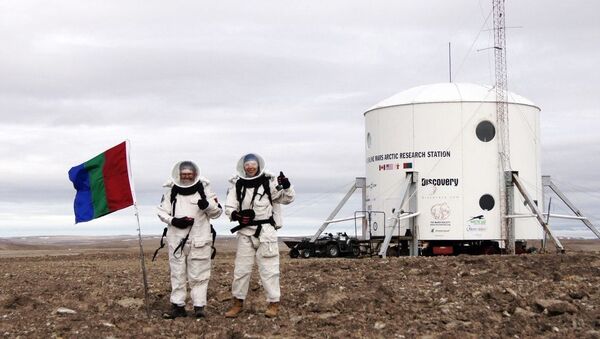Over the past weeks, the world has taken unprecedented measures to contain and fight the spread of the coronavirus disease. Borders are being shut, flights cancelled, production suspended and people sent home. In Russia, President Vladimir Putin signed an order designating the week of March 30 a paid holiday to encourage people to stay home and therefore prevent the disease from further spreading.
Stepanova has been a crew member of SIRIUS-19 and Mars 160 — international projects simulating space missions to the Moon and Mars — and through that has had experience with months-long periods of isolation.
"Isolation is not a reason to panic, but a reason to reconsider your life, attitude to the planet, to family and relatives, to your health and everything that surrounds us. After the first isolation, I saw life and the world with different eyes. At the Martian station, I felt unity with nature and the planet as much as ever", Stepanova said.
After returning to Moscow, it was difficult to get used to "the constant informational noise that pollutes our thinking so much, distracts and interferes with concentration", she added.
The orders for self-isolation at home due to the pandemic caught many off guard, but Anastasia Stepanova, a participant of space simulation experiments, believes that these requirements are not just feasible - you can even benefit from quarantine.
Participation in International Space Projects
Stepanova, who is a junior research fellow at the Institute of Biomedical Problems of the Russian Academy of Sciences, a space journalist, and a rescue volunteer at the SpasReserv, said that space has been her dream ever since she fell in love with science fiction.
"Of course I dreamed of getting there [to space] to explore the Universe even deeper", she said.
When in 2013 Mars Society announced an open call for volunteers for the international project Mars-160 — initially planned as a year-long mission in an Arctic station, which simulates life on Mars — Stepanova submitted her documents to bring her space dream closer to being realised.
"I applied and after a few years of qualifying rounds I made it to the finals. But by then, the programme was changed to 3 months in Utah and 1 month in the Arctic. In the end, I got into it and joined a wonderful international crew, being the only one from Russia, and the only one with humanitarian education at that time", she said.
The programme was an imitation of life on Mars, and the participants could only leave the station in spacesuits to conduct microbiological and geological studies, Stepanova recalled.
"We rehearsed how to look for life on Mars based on microbiology as well as the search for extremophiles - these are microorganisms that survive in extreme conditions. It is these microorganisms that can live on Mars. For example, we found extremophiles in the minerals of gypsum, which is in abundance on Mars. Then, we put these sleeping microorganisms in a special solution in which they woke up and showed themselves", she went on to say.
During the SIRIUS-19 experiment, which simulated a Moon mission, Stepanova studied the psychology and behaviour of a person in a confined space in extreme conditions in the ground-based experimental complex of the Institute of Biomedical Problems of the Russian Academy of Sciences. The project was carried out jointly with NASA.
Isolation in Projects and Today
Stepanova went on to say that after the Mars-160 experiment, it was not at all difficult for her to go through isolation for the next project.
"On the contrary, it was very easy, primarily due to the busy schedule, regime, physical activity, friendly team, and high motivation to contribute to space exploration. It all helps to live and enjoy a similar experience. I consider isolation a unique and cool chance to test yourself, to be surrounded by the same enthusiasts and to do what you love", she said.
Only by being flexible and adaptable, can one overcome long periods of isolation, she added.
"It is very important when in such teams all members are motivated and understand the ultimate high goal", the scientist said.
While the isolation during the projects was voluntary, Stepanova went on to say, the participants did not have the comforts of home that people now get during self-quarantine.
"We are all in comfortable apartments and houses with Internet... You can treat yourself to your favourite food, order online something that will make you happy, chat on the phone, look out the window and see the sun. We did not have all that during the experiments. And if you look at yourself from the outside, perhaps we have become too spoiled and that’s why many have a negative reaction when we are limited in something, even for our good", she added.
Tips to Have Useful Isolation
Stepanova gave some pieces of advice on how to enjoy an isolation period, which is necessary today to contain the spread of the coronavirus and protect the entire world.
"First, observe the regime, wake up at the same time, be physically active, hold a plank for a minute -minute and a half, and, then cook a delicious breakfast. After breakfast, you can quickly read the news and get to work, creative work, rmareading, cleaning the apartment, that is, useful things", she said.
Stepanova also stressed the importance of communicating with family and friends.
"We are used to chasing something invisible, having endless things to do, and we are completely unaccustomed to catching inner silence and harmony, stopping not for a minute, but for a few hours, for a day, to exhale and become aware of ourselves at the moment", she also recommended.
Also, no matter how boring it is, one also needs to limit aimless internet browsing, she concluded.



